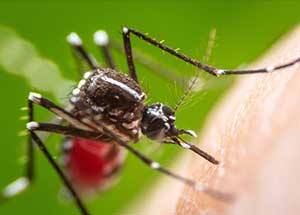Mosquitoes have many enemies, including some birds, bats, dragonflies, and human hands smacking them. They also hate the mosquito repellent DEET, which is found in many mosquito repellents.
Mosquitoes also hate other natural insect repellents including citronella, geranium oil, peppermint oil, citrus oils, eucalyptus, or rosemary. They also don't care too much for garlic juice! As far as plants go, the ones that repel mosquitoes are marigolds, basil, thyme, catnip, lavender, and lemongrass. So if you have a garden or backyard in your Baltimore home, it is a great idea to plant some of these plants to help prevent mosquito bites, thereby helping to prevent mosquito borne disease. When you add this along with a Baltimore mosquito pest control service from Queen "B" you will be greatly slowing down the disease transmission potential!






